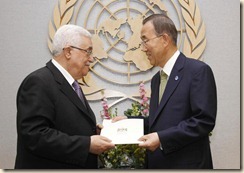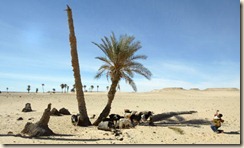Last week the Palestinian Authority’s nominal president Mahmoud Abbas defied U.S. and Israeli  pressure and submitted an application to the United Nations to become a Member State of the international organization. Many people on both sides of the Israel/Palestine situation have questioned why Abbas has chosen to make this move.
pressure and submitted an application to the United Nations to become a Member State of the international organization. Many people on both sides of the Israel/Palestine situation have questioned why Abbas has chosen to make this move.
The 1993 Oslo Accords established the Palestinian Authority (PA) and initiated the peace process which was envisioned to lead to a Palestinian state within five years. Instead the Oslo process has led to two decades of alternating negotiations and violence. Instead of a Palestinian state, the Oslo process has led to continued Israeli occupation, construction of a wall that divides families and confiscates land, increased blockades and road closures, more Jewish settlements on the West Bank and further Israeli land annexation
In 2008, faced with an interminable process that was going nowhere, Abbas and his nominal prime minister, Salam Fayyad, embarked on a new strategy which included the building of state institutions before sovereignty. This approach assumed that, once state institutions were in place, international pressure would force Israel to recognize Palestinian rights. This has proved to be a false hope.
Abbas and Fayyad have realized that the U.S. and Israel are satisfied with the status quo and that Obama is now in full campaign mode and unlikely to do anything that would have domestic political consequences. With the Arab Awakening going on all around him, Abbas has become desperate to change the political landscape. The move to the UN was the outcome. It is a desperate gamble with uncertain consequences
With the U.S. certain to veto the Member State application in the Security Council, the recognition of Palestine as a non-member state in the General Assembly is the most likely result. Unless the PA leadership has a strategy (strategic thinking is not their strong suit) to follow up with actions at the International Criminal Court and International Court of Justice and to capitalize on the United States’ weakened and isolated position to break the U.S. stranglehold on the peace process, they may end up with the provisional state that Netanyahu has frequently broached. This outcome will have little effect in improving the situation on the ground for ordinary Palestinians.
In the end, the outcome may rest in the hands of the Palestinian people themselves. The Arab Awakening which started in Tunisia and Egypt and has spread across the region has demonstrated the ability of the people to rise up and say “enough is enough” and overthrow their unelected leaders and demand their rights. The Arab Spring may eventually arrive in Palestine.
{Photo by UN News Center)
